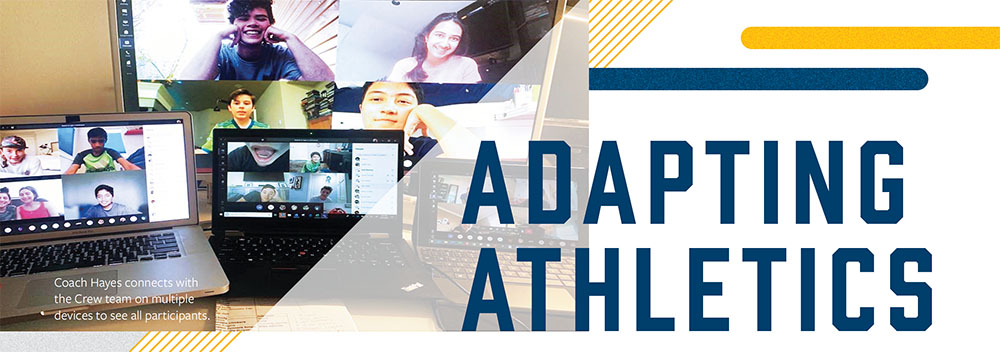
By Kim Eng, Director of Athletics
GROWING UP AMIDST MY CHINESE relatives, there was a curse I heard on multiple occasions that said, “May you live in interesting times.” If nothing else, I think we can all agree that 2020 has been pretty darn interesting thus far—for society at large, as well as EPS and our athletic program.
In fact, it was on the very first scheduled day of spring sports, March 2, that EPS made the tough (but correct) decision to move to remote learning in light of the COVID-19 outbreak. At the time, we thought the closure might be for just a few weeks. However, as time passed, and the number of cases grew across the country and around the world, it became clear that neither the sports program nor school at-large would be resuming normal operations for the remainder of the 2019- 2020 school year. Admittedly, as the head of Athletic operations, it took me a surprising amount of time to process the news and come to terms with my grief. I would not get to cheer on our athletes during competitions, interact with parents along the sidelines, or bond with students and coaches during the inevitable ups and downs of athletic competition. But most importantly, I was devastated that our student athletes weren’t going to get the opportunity to engage in a “normal” season of sports—and to pursue their dreams of breaking school records, setting personal records, winning league championships, and engaging in the excitement of competition and camaraderie with friends.
In true EPS fashion, however, our coaches and athletes quickly set their disappointment aside and rallied unlike anything I have ever witnessed before. Thinking outside of the box, we decided to shift the entire range of sports practices into a remote format, and while participation did diminish a bit, the majority of our athletes logged on with enthusiasm each day and embraced their new “virtual” practice regimen.
Such a pivot, however, was not as easy as it may sound. Not only would there be little to no opportunity to run cooperative, team-based drills, but many sports required the athletes to have practice space—and equipment—that wasn’t always universally available. However, we pooled our creativity together and rose to the challenge. Our coaches adjusted the focus of practices to emphasize individual fitness, skills, and fundamentals. We procured whatever additional equipment was necessary to ensure that each soccer player had a ball and each ultimate player had a disc. Our coaches produced videos and performed live skill demonstrations for our players to emulate. And for highly individualized sports, like track and field, our athletes would meet online with their coaches at the beginning of each practice and then transition into various breakout rooms tailored to distance running, sprinting, or throwing, so each athlete could concentrate on their area of expertise.
As just one shining example of adaptability, coach Melissa Hayes came up with a series of novel ways to train the rowing team without them having access to a single boat, oar, or body of water. She gave her athletes a forum to share how they were feeling about the sudden cancellation of their season. They then discussed ways they could leverage the limited space and equipment in each student’s home to continue their training. Hayes’ motto for her PE classes and rowing teams has always been to “adapt to the circumstances and environment” (since water conditions change and unexpected obstacles emerge) and the COVID-19 challenge presented yet another opportunity to embody this philosophy. So, they made the best of it and whether doing team challenges, scavenger hunts, or partner workouts, they pushed on through the uncertainty. And since rowing was the only sport that still had an actual competition to prepare for, all of our crew team members competing at Regionals and Nationals continued to train late into May. Most importantly, they all improved tremendously and gained speed—with one specific student, AJ (’22), achieving a personal best and placing fifteenth at Nationals.
AS JUST ONE SHINING EXAMPLE OF ADAPTABILITY, COACH MELISSA HAYES CAME UP WITH A SERIES OF NOVEL WAYS TO TRAIN THE ROWING TEAM WITHOUT THEM HAVING ACCESS TO A SINGLE BOAT, OAR, OR BODY OF WATER.
Ultimately, despite the unprecedented difficulties that needed to be overcome, Coach Hayes still looks at these last few months in a glass-half-full way and has observed that as a result of these experiences, “It is unlikely any athlete will ever again take for granted a single moment. Every class, practice, competition, race, and interaction with another person is appreciated in a new way.”

Anushka (’20) with the senior athlete sign delivered to her home.
This innovative spirit continued. When we weren’t able to hold our annual spring tailgate celebration for Senior Night, we created a special video with heartfelt speeches and clips of our coaches celebrating each of their seniors. When we were unable to gather for our end-of-year sports banquet, we enlisted our athletes and coaches in creating a video slideshow where each student passed a ball to an online teammate, off-screen, and had the chance to show off their newly-honed skills along with a dash of creativity, humor, and personality. Time after time, I was not only blown away by the resiliency of all involved, but also by the ingenuity of our students, coaches, and parent supporters in dealing with the new realities and finding a way to work around them.
What does the future of athletics look like during these challenging times? The answer changes daily. At present, our plan is to get our athletes out on the field/court/water as soon as we can safely do so, following the most current guidance offered by the CDC, NFHS, WIAA, and DOH—all organizations that I’ve become intimately familiar with over the past few months. Our hope is that we can follow a phased approach to returning to play, where we examine the specific risk factors for each sport and take cautious baby steps forward—with ample testing and scrutiny along the way—in the hopes of a one-day return to normalcy.
Although there are obvious physical and mental benefits that come from playing sports, and many of us consider them an essential part of the school experience, we all need to acknowledge that the health and safety of each student must ultimately remain the paramount concern. The decision to participate in sports this year, or even attend events as a spectator, will therefore be entirely dependent on each athlete and the comfort level of their families.
In closing, and in true EPS style, we’ll continue to adapt to these “interesting times” and whatever they throw at us—and having witnessed the numerous incredible ways our coaching staff rose to the challenge during these past months, I’m confident the upcoming season(s) will be no different. Sports will continue to be a critical aspect of the Eagle experience, for those who wish to participate, and we vow not to let this annoying new competitor, the COVID-19, get in our way!

